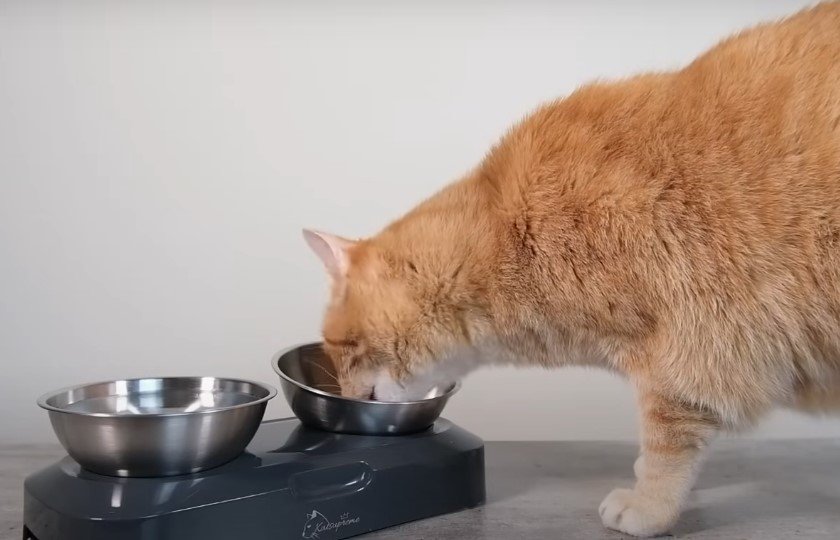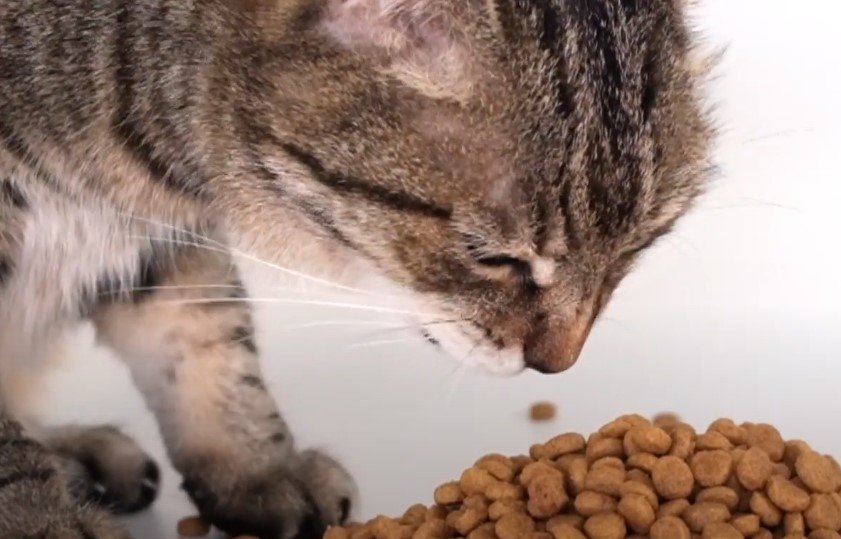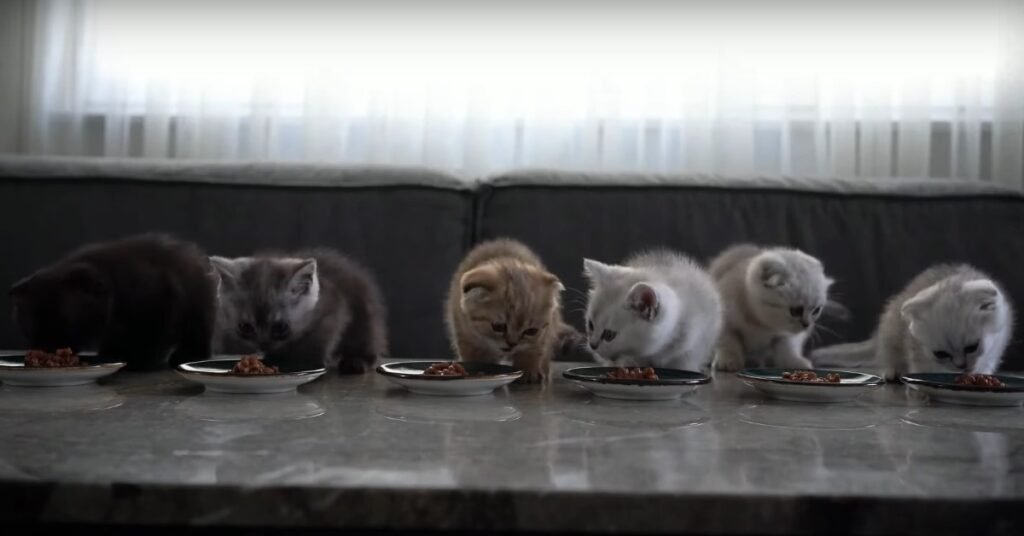
Many cat owners face difficulty ensuring their aging cats receive proper nutrition. Kitten food is rich in fats, proteins, and vitamins to help them grow and stay healthy, but what if you accidentally feed kitten food to your older cat? Can older cats eat kitten food?
Yes, older cats can eat kitten food, but it’s not ideal for a long time, because it may cause weight gain or health issues in older cats.
There is nothing harmful in kitten food for senior cats. It can even help underweight or sick cats. The extra nutrients in kitten food can support recovery and improve their health.
This article dives into the nutritional challenges senior cats face. It will explore whether kitten food can meet their needs, its dietary differences, and what to consider when feeding your aging feline friend.
What’s the difference between kitten food and senior cat food?
Cats at different life stages need different nutrients to stay healthy. Here’s how kitten food and senior cat food are different:
Calories
- Kittens need more calories because they’re growing fast and very active.
- Senior cats require fewer calories as they move less and have slower metabolisms.
Protein
- Kittens need more protein to grow muscle and support development. Their food typically contains 35-40% protein.
- Senior cats still need protein, but in lower amounts to maintain muscle without straining their kidneys.
Fats and Fatty Acids
- Kittens need more fat and fatty acids for energy and brain development.
- Senior cats need less fat to prevent weight gain. Both age groups need different proportions of omega-3 and omega-6 fatty acids to support their specific health needs.
Minerals and Vitamins
- Kittens need more calcium and phosphorus for strong bones and teeth. Their food is rich in vitamin D, which supports growth.
- Senior cats need more antioxidants, vitamin E, and beta-carotene to boost their immune systems and fight aging effects.
Nutritional Differences by Life Stage:
Kittens (Up to 1 Year):
- Protein: Need 35-40% for growth and muscle building.
- Fat: Requires 20-25% for energy and a healthy coat.
- Minerals: High calcium and phosphorus help build strong bones and teeth.
Adult Cats (1-7 Years):
- Protein: About 25-30% to keep muscles healthy.
- Fat: Around 15-20% to avoid weight gain.
- Balanced Diet: Supports health without extra calories.
Senior Cats (7+ Years):
- Protein: Senior cat needs 20-25% protein to help aging kidneys.
- Calories: Lower, at about 150-200 calories per day, for less active cats.
- Supplements: Glucosamine and chondroitin for joints; omega-3s for inflammation.
- Digestive Support: Uses easy-to-digest ingredients and more fiber for slow metabolism.
- Antioxidants: Extra antioxidants help with aging and oxidative stress.

Can older cats eat kitten food?
As I said before, older cats can eat kitten food, but it is not the best choice for their health because it may cause weight gain or health issues in older cats.
Why Kitten Food Isn’t Ideal for Senior Cats?
High Calories: Kitten food has more calories, which can make older cats gain weight.
Too Much Protein and Fat: Older cats don’t need as much protein or fat as kittens. Too much protein can strain aging kidneys, and excess fat can lead to obesity.
Missing Nutrients: Kitten food lacks some nutrients that senior cats need, like antioxidants and joint-supporting nutrients.
When Can a Senior Cat Eat Kitten Food?
Senior cats can eat kitten food in some cases, like:
- If your older cat is too thin and needs more calories, you can feed them kitten food to help them gain weight. You can also check out this article: How to Help a Senior Cat Gain Weight.
- If the vet recommends it for specific health reasons.
Can Kitten Food Make Older Cats Sick?
Feeding kitten food to older cats can cause several issues:
Major Risks
Weight Gain: High calories can lead to obesity in less active senior cats.
Kidney Strain: Excess protein in kitten food can stress aging kidneys, increasing the risk of kidney problems.
Nutrient Imbalance: Kitten food lacks antioxidants, omega-3s, and joint-supporting nutrients essential for senior cats.
Minor Risks
Digestive Upset: Older cats may struggle to digest the rich ingredients in kitten food, leading to vomiting or diarrhea.
Excess Energy: High fat levels can lead to restlessness or weight gain.
Nutritional Deficiency: Continuous feeding of kitten food might leave senior cats lacking essential nutrients for immunity and joint health, even if they appear healthy initially.
Can kittens eat senior cat food?
No, kittens should avoid senior cat food because senior cat food has lower protein and fat. It does not provide the necessary nutrients for their rapid growth and development.
Kittens need food specifically made for them. It has the right amount of protein, fat, and minerals to help them grow.
Feeding senior cat food to kittens can slow their growth. It doesn’t have enough protein and fat for energy and muscle development. Kittens also miss out on the calcium needed for strong bones and teeth.

How to Introduce Kitten Food to an Older Cat?
If your vet recommends feeding kitten food to an older cat, follow these steps to ensure a smooth transition:
- Start Gradually: Mix a small amount of kitten food with their usual food. Increase the portion of kitten food gradually over 7–10 days to avoid stomach upset.
- Monitor Their Reaction: Monitor for vomiting, diarrhea, or lethargy. If issues occur, slow the transition or consult your vet.
- Control Portions: Serve small portions to prevent overeating, as kitten food is high in calories.
- Ensure Hydration: Kitten food, especially dry types, can increase thirst. Ensure you always provide fresh water.
- Limit Use: Only feed kitten food temporarily and return to senior cat food as soon as possible.
How to stop older cats from eating kitten food?
It is a common problem for cat owners to keep older cats away from the tempting kitten food. To stop older cats from eating kitten food, follow these steps:
1. Separate Their Food: Keep kitten food out of reach. Feed senior cats in a separate area.
2. Different Bowls: Use different bowls for kitten and senior food to avoid mix-ups.
3. Switch Gradually: If your cat likes kitten food, slowly switch to senior food with smaller amounts each day.
4. Stick to Senior Food: Provide food made for older cats with the right protein, fat, and nutrients.
5. Monitor Their Diet: Make sure senior cats are eating their food and not kitten food by watching mealtimes.
Final Thoughts
Feeding kitten food to an older cat can sometimes be necessary, such as for weight gain or specific health needs, but it’s not the best option for regular feeding. While kitten food is rich in calories and nutrients essential for growth, it may lead to weight gain, kidney strain, or nutrient imbalances in senior cats. It lacks vital elements like antioxidants and joint-supporting nutrients that aging cats require.
FAQ: Can Older Cats Eat Kitten Food?
1. Is kitten food safe for older cats?
Kitten food is not toxic to older cats, but it has high calories, fat, and protein. Regular feeding can cause weight gain and strain the kidneys, especially in senior cats.
2. Can kitten food help a senior cat gain weight?
Yes, kitten food can help underweight senior cats gain weight due to its high-calorie content. However, it should only be used under a vet’s guidance to avoid health issues.
3. Will kitten food give my senior cat more energy?
Kitten food is rich in protein and fat, which may boost energy, but it can also lead to obesity if not monitored. A balanced senior diet is better for long-term health.
4. How long can an older cat eat kitten food?
Older cats should only eat kitten food temporarily if they need extra calories or are recovering from illness. Once they regain weight, they should return to senior-friendly food.
5. What’s the best way to switch an older cat off kitten food?
Gradually mix senior cat food with kitten food over 7–10 days. Slowly increase the senior food portion while reducing kitten food to avoid digestive issues.

